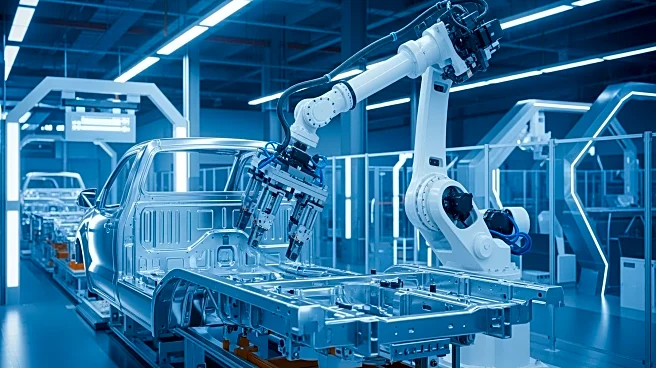What's Happening?
Ford has announced a significant increase in production for its F-150 and F-Series Super Duty trucks, aiming to produce over 50,000 additional units by 2026. This decision comes in response to production setbacks
caused by a fire at a Novelis plant, which supplies aluminum to Ford. To facilitate this increase, Ford plans to add a third crew at its Dearborn truck plant and additional employees at its Louisville truck plant. The expansion is expected to create up to 1,000 new jobs, helping Ford recover from the supply chain disruption and meet demand for its popular truck models.
Why It's Important?
The expansion of Ford's truck production is crucial for the company as it seeks to mitigate the impact of supply chain disruptions caused by the Novelis plant fire. By increasing production capacity and workforce, Ford aims to maintain its competitive edge in the truck market, which is a significant revenue driver for the company. The creation of new jobs also highlights Ford's commitment to supporting local economies and addressing employment needs. This move may influence other automakers to reassess their production strategies in light of supply chain vulnerabilities.
What's Next?
Ford's decision to expand production could lead to increased competition in the truck market, prompting other manufacturers to enhance their production capabilities. The company will likely focus on ensuring a stable supply of materials and components to prevent future disruptions. Additionally, Ford may explore further investments in technology and infrastructure to bolster its production efficiency and resilience against unforeseen events. Stakeholders, including employees and suppliers, will be closely monitoring the implementation of these plans and their impact on Ford's market position.
Beyond the Headlines
The incident underscores the importance of supply chain resilience in the automotive industry. Ford's proactive response may set a precedent for other companies to develop contingency plans for similar disruptions. The expansion also reflects broader industry trends towards hybrid and electric vehicle production, as Ford balances traditional internal combustion engine models with newer technologies. This strategic pivot could influence long-term shifts in manufacturing practices and employment patterns within the sector.











